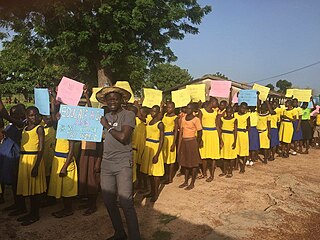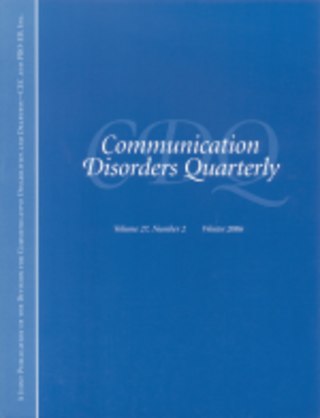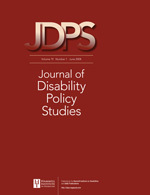Special education is the practice of educating students in a way that accommodates their individual differences, disabilities, and special needs. This involves the individually planned and systematically monitored arrangement of teaching procedures, adapted equipment and materials, and accessible settings. These interventions are designed to help individuals with special needs achieve a higher level of personal self-sufficiency and success in school and in their community, which may not be available if the student were only given access to a typical classroom education.
Americans with disabilities are a significant minority group in the United States, making up a fifth of the overall population and over half of Americans older than eighty. There is a complex history underlying the United States and its relationship with its disabled population, with great progress being made in the last century to improve the livelihood of disabled citizens through legislation providing protections and benefits. Most notably, the Americans with Disabilities Act is a comprehensive anti-discrimination policy that works to protect Americans with disabilities in public settings and the workplace.

Inclusion in education refers to all students being able to access and gain equal opportunities to education and learning. It arose in the context of special education with an individualized education program or 504 plan, and is built on the notion that it is more effective for students with special needs to have the said mixed experience for them to be more successful in social interactions leading to further success in life. The philosophy behind the implementation of the inclusion model does not prioritize, but still provides for the utilization of special classrooms and special schools for the education of students with disabilities. Inclusive education models are brought into force by educational administrators with the intention of moving away from seclusion models of special education to the fullest extent practical, the idea being that it is to the social benefit of general education students and special education students alike, with the more able students serving as peer models and those less able serving as motivation for general education students to learn empathy.
In clinical diagnostic and functional development, special needs refers to individuals who require assistance for disabilities that may be medical, mental, or psychological. Guidelines for clinical diagnosis are given in both the Diagnostic and Statistical Manual of Mental Disorders and the International Classification of Diseases 9th edition. Special needs can range from people with autism, cerebral palsy, Down syndrome, dyslexia, dyscalculia, dyspraxia, dysgraphia, blindness, deafness, ADHD, and cystic fibrosis. They can also include cleft lips and missing limbs. The types of special needs vary in severity, and a student with a special need is classified as being a severe case when the student's IQ is between 20 and 35. These students typically need assistance in school, and have different services provided for them to succeed in a different setting.
Karen R. Harris is an American educational psychologist and special educator who has researched the development of learning strategies and self-regulation among students with learning challenges such as learning disabilities and attention deficit hyperactivity disorder. She is currently the Mary Emily Warner Professor in the Division of Educational Leadership and Innovation, Mary Lou Fulton Teachers College at Arizona State University.
In the United States education system, School Psychological Examiners assess the needs of students in schools for special education services or other interventions. The post requires a relevant postgraduate qualification and specialist training. This role is distinct within school psychology from that of the psychiatrist, clinical psychologist and psychometrist.
The term twice exceptional, often abbreviated as 2e, entered educators' lexicons in the mid-1990s and refers to gifted students who have some form of learning or developmental disability. These students are considered exceptional both because of their giftedness and because they are disabled or neurodiverse. Ronksley-Pavia (2015) presents a useful conceptual model of the co-occurrence of disability and giftedness.
Frank R. Rusch is an American educational psychologist. He researches self-instructional strategies, coworker and natural supports, benefit-cost analysis, and model program evaluation as well as his contributions to the conceptualization and implementation of supported employment and secondary transition services. His contributions to supported employment include the establishment of the first "supported work" model in the fall of 1975 at the University of Washington while a doctoral student.
Steven Forness is a psychologist doing research in the field of emotional disorders in children. His main interest is the "early detection and eligibility of children with psychiatric disorders for special education services in public schools". He has earned many awards and is a Distinguished Professor Emeritus of Psychiatry and Biobehavioral Sciences at the University of California, Los Angeles.
The Assistive Technology Industry Association (ATIA) is a not-for-profit membership organization of manufacturers, sellers and providers of technology-based assistive devices and/or services, for people with disabilities. ATIA represents the interests of its members to business, government, education, and the many agencies that serve people with disabilities. One goal of the ATIA is to "speak with the common voice" for Its mission is to serve as the collective voice of the Assistive Technology (AT) industry so that the best products and services are delivered to people with disabilities.

Communication Disorders Quarterly is a quarterly peer-reviewed academic journal that covers research on typical and atypical communication, from oral language development to literacy in clinical and educational settings. The editor-in-chief is Judy Montgomery. It was established in 1976 and is currently published by SAGE Publications in association with the Hammill Institute on Disabilities.

The Journal of Disability Policy Studies is a quarterly peer-reviewed academic journal that covers the field of disability studies, including issues in ethics, public policy, and the law related to individuals with disabilities. The editors-in-chief are Mitchell Yell and James G. Shriner. It was established in 1990 and is currently published by SAGE Publications in association with the Hammill Institute on Disabilities.
Michael Lee Wehmeyer is the Ross and Marianna Beach Distinguished Professor in Special Education and Chairperson of the Department of Special Education at the University of Kansas. His research focuses on self-determination and self-determined learning, the application of positive psychology and strengths-based approaches to disability, and the education of students with intellectual or developmental disabilities. He is Director and Senior Scientist at Kansas University's Beach Center on Disability. He formerly directed the Kansas University Center on Developmental Disabilities.

The California Department of Rehabilitation (DOR) is a California state department which administers vocational rehabilitation services. It provides vocational rehabilitation services and advocacy from over 100 locations throughout California seeking employment, independence, and equality for individuals with disabilities. The DOR was established on October 1, 1963.
The College of Education is one of 15 colleges at The Pennsylvania State University, located in University Park, PA. It houses the departments of Curriculum and Instruction, Education Policy Studies, Learning and Performance Systems, and Educational Psychology, Counseling, and Special Education. Almost 2,300 undergraduate students, and nearly 1,000 graduate students are enrolled in its 7 undergraduate and 16 graduate degree programs. The college is housed in four buildings: Chambers, Rackley, Keller, and CEDAR Buildings.
Nicholas Hobbs was an American psychologist and a past president of the American Psychological Association (APA).

Worldwide, there are between 180 and 220 million youth with disabilities. Eighty percent of disabled youth live in developing countries, and therefore have even less access to education, health care, jobs and general rights. Disabilities include physical, mental disabilities or mental illness. Many youth live normal and stable lives, however those with disabilities may experience more obstacles than those without due to potential limitations, those created by physical limitations and social limitations.
Lynn Fuchs is an educational psychologist known for research on instructional practice and assessment, reading disabilities, and mathematics disabilities. She is the Dunn Family Chair in Psychoeducational Assessment in the Department of Special Education at Vanderbilt University.

The New England Center for Children (NECC) is a nonprofit, private, special education school in Southborough, Massachusetts, United States. NECC provides comprehensive services for children with autism spectrum disorder between the ages of 3-22 years old. They have a school serving 200 students, about half living in one of the 14 residential group homes.






